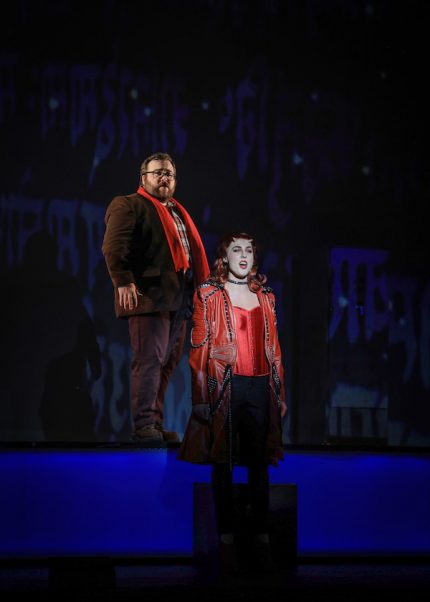Young cast provides worthy advocacy for Heggie’s uneven “If I Were You” at Northwestern Opera Theater

A deal with the devil is an operatic tale as old as time.
Northwestern University is currently presenting the Midwest premiere of Jake Heggie’s 2019 opera If I Were You. In this modern telling of the classic Faust story, a dispirited writer named Fabian makes a deal with the devil that allows his soul to inhabit the bodies of others. However, if he returns to his original body, he will die.
Of course, he uses this power to get closer to Diana, the woman he has fallen in love with, hoping that she might love him in a different package. As he hops from corporeal vessel to corporeal vessel, he leaves soulless zombies in his wake, his ruse ultimately destroying everyone Diana truly cares about.
Diana puts on her Indiana Jones adventurer’s hat to uncover what is going on. After Fabian witnesses Diana offer the devil her own soul to recover the souls of those he destroyed, Fabian makes the decision to sacrifice himself—but not before sharing a tender, if clichéd, moment with Diana as he lay dying.
The libretto by frequent Heggie collaborator Gene Sheer is based on a book by Julien Green called Si j’étais vous. Though the story is predictable, Sheer inflects the libretto with humor and colorful characters, particularly for the part of the devil, Brittomara, who dons numerous disguises as an EMT, car mechanic, bartender, and hairdresser. The show could use some dramatic tightening up in the second act and seemed longer than its 2-1/2 hours.
Musically, Heggie’s score is appealing if not exactly earth- shattering. As is typical of Heggie’s operatic and song output, he integrates flavors of other musical genres, such as swing, jazz, rock, musical theater and mambo, and his vocal lines are eminently singable, which is often not the case in contemporary opera.
However, the end product comes across sounding a bit like painting by numbers. There were a few standout moments in the score, including the “Zombie Chorus” at the beginning of Act II, which displayed greater harmonic ingenuity and provided a welcome textural change.
The young cast was impressive throughout. Originally commissioned by the Merola Young Artist Program at San Francisco Opera, the opera is well suited for younger voices.
This is not to say the roles are not demanding. Brittomara, sung on Saturday by mezzo-soprano Sarah Zieba, was on stage for almost the whole opera and had to seamlessly shift between different vocal styles, singing operatically one moment and like a cabaret singer the next. Zieba’s stylistic flexibility and enigmatic stage presence was impressive, though the use of straight-tone slides and throaty effects got somewhat tiresome after a while.
Tenor Aaron Short as the anti-hero, Fabian, was another vocal standout. His voice was consistent and easy throughout his range, and his high floated pianissimos were a highlight of the show. Short was endearing as Fabian in his original incarnation and brought vocal nuance to the role—so it was a shame when he died halfway through the first act and had to lie motionless downstage for most of the rest of the opera. It was refreshing to hear him again at the end, but it reminded the audience of what they missed.
The true protagonist of the show is the plucky Diana, sung by soprano Isobel Anthony. She had arguably the most demanding role, appearing in nearly every scene and singing almost nonstop in the second act. Anthony’s sweet-toned light lyric soprano was rock solid, and her diction was impeccable without being overwrought. She paced herself wisely, though this meant some of her climactic high notes were a bit lacking in impact; also her singing was too sweetly done for the moment in which she accidentally shoots Rachel. Overall, though, she possessed vocal assuredness far beyond her years and a natural stage presence.
Because Fabian inhabits the bodies of numerous victims throughout the opera, this allows for a large cast of characters. In the role of Diana’s best friend, soprano Megan Fleischmann made for a spunky, bright-voiced Selena. Bass-baritone Nathan Savant brought physical humor and vocal power to the role of Putnam, Fabian’s crotchety boss.
Baritone David Wolfe sang the role of Paul, the jerky frat boy who turns into a softy once Fabian inhabits him. He was also solid vocally, and his dramatic shift in character was well played. Rounding out the cast were baritone Elio Bucky as Jonathan, tenor Nate Bear as David, mezzo-soprano Miya Higashiyama as the ill-fated Rachel, and sopranos Michelle Ravitsky and Kaytlin Withers as two drunk girls at the bar.
The production, directed and designed by Joachim Schamberger, made strategic use of projections to create different settings and evoke the faux Indian mysticism of Fabian’s body-hopping incantation. The costumes, designed by Jana Anderson, mostly consisted of everyday street clothes except for Brittomara, who slinked around the stage in black leather leggings, a red satin corset, and a steampunk red leather jacket.
The student orchestra, led by Joseph Mechavich, was assured in the stylistic shifts of the score. The ensemble between the stage and the pit was generally very tight, though in the climactic moments, the orchestra covered the lighter-voiced singers.
The final performance of If I Were You takes place 3 p.m. Sunday at Cahn Auditorium. music.northwestern.edu
Posted in Performances

